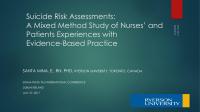| dc.contributor.author | Lavoie, Patrick | en |
| dc.contributor.author | Cossette, Sylvie | en |
| dc.contributor.author | Pepin, Jacinthe | en |
| dc.date.accessioned | 2016-08-11T16:05:47Z | |
| dc.date.available | 2016-08-11T16:05:47Z | |
| dc.date.issued | 2016-08-11 | |
| dc.identifier.uri | http://hdl.handle.net/10755/618321 | |
| dc.description | <p>Annual Simulation Conference. Held at the Gaylord Texan Resort & Convention Center</p> | en |
| dc.description.abstract | <p>Previous studies on debriefing have addressed components such as video assistance, duration, content, or educator presence and characteristics (Cheng et al., 2014). However, studies of how nursing students learn in debriefing remain scarce, even if Cook and al. (2008) recommended that educational research addresses processes underpinning learning outcomes. In the first phase of a mixed-methods study, students (n=117) participated in a randomized controlled trial comparing the effect of two debriefing methods after patient deterioration simulations: a reflective debriefing for clinical judgment (REsPoND; Lavoie, Pepin, & Cossette, 2015) or the Plus-delta debriefing technique (Fanning & Gaba, 2007). REsPoND consists in a reflective analysis of a patient deterioration simulation experience through a list of questions designed after Tanner’s (2006) model of clinical judgment and Dewey’s (1907) conception of reflection. Based on the results of the RCT, we interviewed nineteen nursing students who experienced REsPoND to study their perception of how they learned in this debriefing. Thematic analysis of the transcripts revealed that students’ perceived that they learned through a process of describing and analyzing a situation to build a framework of how they should have responded to the simulated patient deterioration situation. Then, they compare their performance to that framework in order to target good behaviors and those that need improvement. The characteristics and interactions of the debriefer and the students (as a group) appear as influential on this process. Variations in students’ perceptions of this process according to their results in the RCT will be presented and discussed.</p> | en |
| dc.format | Text-based Document | en |
| dc.language.iso | en_US | en |
| dc.subject | Clinical Simulation | en |
| dc.subject | Debriefing | en |
| dc.subject | Quantitative Research | en |
| dc.title | How nursing students learn to care for deteriorating patients in debriefing: A mixed-methods study | en |
| dc.type | Presentation | en |
| dc.rights.holder | <p>
All rights reserved by the author(s) and/or publisher(s) listed in this item record unless relinquished in whole or part by a rights notation or a Creative Commons License present in this item record.
</p><p>
All permission requests should be directed accordingly and not to the Sigma Repository.
</p><p>
All submitting authors or publishers have affirmed that when using material in their work where they do not own copyright, they have obtained permission of the copyright holder prior to submission and the rights holder has been acknowledged as necessary.
</p> | |
| dc.description.note | <p>Items submitted to a conference/event were evaluated/peer-reviewed at the time of abstract submission to the event. No other peer-review was provided prior to submission to the Henderson Repository, unless otherwise noted.</p> | |
| dc.type.category | Full-text | en |
| dc.evidence.level | N/A | en |
| dc.research.approach | Mixed/Multi Method Research | en |
| dc.author.details | Patrick Lavoie, RN, MSc, PhD (c); Sylvie Cossette, RN, PhD; Jacinthe Pepin, RN, PhD | en |
| dc.conference.name | International Nursing Association for Clinical Simulation and Learning Annual Conference 2016 | en |
| dc.conference.host | International Nursing Association for Clinical Simulation and Learning | en |
| dc.conference.location | Grapevine, Texas, USA | en |
| dc.date.conferenceyear | 2016 | |
| dc.contributor.affiliation | International Nursing Association for Clinical Simulation and Learning (INACSL) | en |
| dc.description.reviewtype | Abstract Review Only: Reviewed by Event Host | en |
| dc.description.acquisition | Proxy-submission | en |





